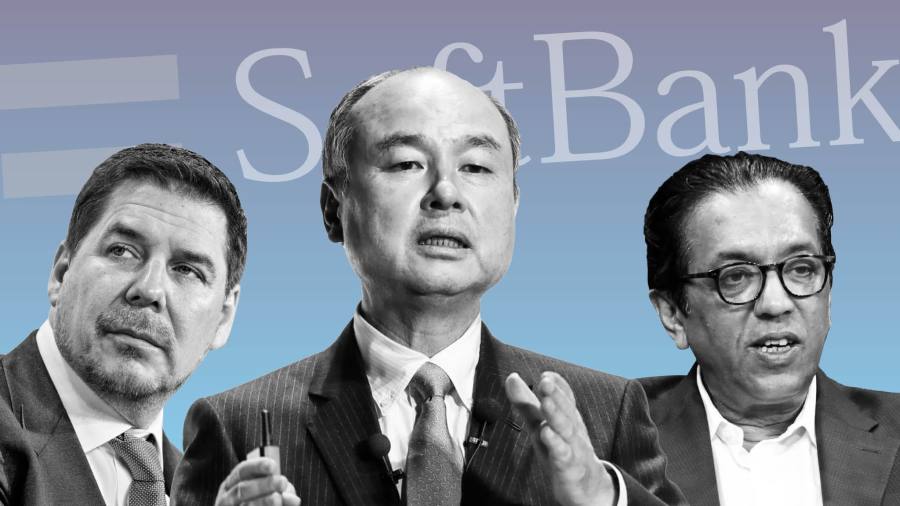[ad_1]
Four top SoftBank executives, including Rajeev Misra and Marcelo Claure, are sitting on a potential collective gain of as much as $1.2bn after receiving unusual loans from the company last year to buy its shares.
SoftBank approved incentive packages in February last year that granted more than $600m in loans to the four men, allowing them buy shares that have rallied sharply.
A one-year lock-up restricting the sale of some of those shares is set to expire next month, giving the lieutenants to SoftBank’s founder Masayoshi Son the option to begin cashing in on the gains.
Some investors have asked the company to clarify whether a board shake-up that saw three of the four men step down as directors in November was linked potentially to avoiding future disclosures of the loans, one person with direct knowledge of the matter said.
Depending on the timing of their individual share purchases, the executives may be sitting on paper gains of around $300m to just over $1.2bn, according to an analysis by the Financial Times.
Mr Misra, who runs SoftBank’s Vision Fund, and Mr Claure, who is SoftBank’s chief operating officer, are individually sitting on gains of as much as $500m each based on those calculations.Â

The duo already rank among the best paid figures in Japan earning $15m and $19.6m last year, in a country where enormous executive pay packages are frowned upon.Â
The loans, which have received little attention, are detailed in SoftBank’s annual report for the year through March 2020, in a section that requires disclosures on dealings between the company and its board directors.Â
The report shows that by the end of March last year, Mr Misra and Mr Claure had been given about $250m each in company loans for the purpose of buying shares in SoftBank. One of those schemes, set up in 2018, also granted $50m each to Katsunori Sago, SoftBank’s chief strategy officer, and Ken Miyauchi, SoftBank’s president.Â
Mr Misra, Mr Claure and Mr Sago all stepped down from SoftBank’s board in November, in what was billed as a corporate governance shake-up at the company, after pressure from the activist hedge fund Elliott Management.Â
The three men’s departure from the SoftBank board may mean that SoftBank will no longer be required to disclose fully their compensation and borrowings from the company to buy shares. One person said SoftBank is discussing whether to keep the same disclosures levels to reassure investors.
“This kind of incentive scheme is extremely rare for Japanese companies,†said Katsuyuki Kubo, a corporate governance expert at Waseda University. “While there is no legal obligation, ideally from a governance perspective, incentives for top executives who are actively involved in running the company should be disclosed since the information is important for investors.â€
Mr Son has essentially backstopped his company’s potential losses on the loans to his lieutenants, with a footnote in the report explaining that the SoftBank founder had guaranteed any “shortfall†between the value of the collateral and the loan.Â
The 63-year-old SoftBank chief executive has provided similar support in the past. In 2019, Mr Son personally guaranteed $2bn of loans taken out by the then 25-year-old founder of Oyo, an Indian hotel business backed by the Vision Fund.Â
One asset manager, whose fund holds a significant stake in SoftBank, said that investors were now probably used to the idea that Mr Son likes senior staff to be both leveraged and incentivised through large holdings of SoftBank stock.Â
“But what we are seeing now seems to be taking that to the extreme. It adds into the picture of a company that is basically one guy calling every single shot, and your choice whether to take whatever risks come with that,†said the investor.
The internal loans and the broader issue of executive compensation has also caused tensions among employees at SoftBank, according to two people with knowledge of the matter, leading to demands by some to receive greater pay or upside from successful deals.
SoftBank declined to comment on the incentive scheme.
The FT has previously reported that several employees expressed shock following the disclosure of Mr Misra’s pay last year. The FT has also reported that Mr Misra has considered relocating from London where he runs SoftBank’s Vision Fund to Abu Dhabi over the past several months.
At the time, the person close to Mr Misra said any move would have been part of a wider plan for the Japanese company to reduce its tax rate by moving the headquarters of its investment arm. The person also downplayed the suggestion that Mr Misra would personally move to the UAE, which does not tax capital gains, from his London base.
SoftBank shares have been trading near their highest level in more than two decades in recent weeks as a global technology rally has boosted the value of its holdings.
Daily newsletter

#techFT brings you news, comment and analysis on the big companies, technologies and issues shaping this fastest moving of sectors from specialists based around the world. Click here to get #techFT in your inbox.
The turnround marks a stark recovery after its disastrous investment in WeWork and a crash in SoftBank’s share price in March of 2020, which set off a series of large stock buybacks and the sale of $90bn of assets to pay down its debt.
If the executives used the loans to acquire shares after the sharp market sell-off last year, they may be sitting on gains of about 206 per cent before any interest owed to the company. If the shares were acquired earlier, for instance at their peak price during the February to March period of last year, they would instead be up just over 46 per cent.Â
Mr Son is the largest shareholder in SoftBank, owning 25 per cent directly and indirectly, and the biggest beneficiary of the rally in its share price.Â
Additional reporting by Leo Lewis
[ad_2]
Source link





